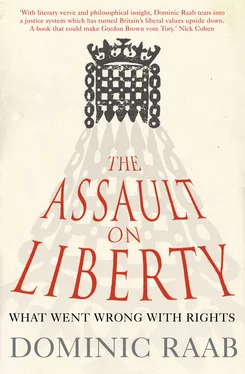1 ...6 7 8 10 11 12 ...16 We have become accustomed to national security being regularly cited as one of the main grounds for sacrificing individual liberty, particularly in the aftermath of 9/11 and subsequently the 7/7 attacks in London. Yet Britain has faced serious threats to its national security before, without knee-jerk resort to such far-reaching, unfocused and permanent measures that seek to redefine the fundamental balance in the relationship between the citizen and the state.
During the Second World War identity cards and internment were introduced in the face of global war and direct military attack. In 1940, faced with the Blitz and the real prospect of a Nazi invasion, the government interned a range of ‘enemy aliens’, principally Italian and German civilians living in Britain. Around eight thousand were detained although most had been released by 1942 and the legal basis was revoked at the end of the war. Yet, as A. C. Grayling notes, from 1940, faced with an imminent invasion by Nazi Germany, temporary measures were taken that undermined individual liberty. In contrast today, ‘in face of a far lesser threat’, Britain is ‘enacting permanent legislation of even more draconian kinds’.
Churchill only reluctantly introduced temporary wartime measures that infringed individual liberty, removing them once the immediate exigencies allowed. When Oswald Mosley, the notorious Nazi sympathizer, was released from internment in 1943, Churchill sent a telegram to the Home Secretary justifying the decision in the following terms:
[T]he great privilege of habeas corpus, and of trial by jury, which are the supreme protection invented by the English people for ordinary individuals against the State…The power of the Executive to cast a man into prison without formulating any charge known to the law and particularly to deny him the judgement of his peers – is, in the highest degree, odious and is the foundation of all totali tarian governments…Extraordinary powers assumed by the Executive with the consent of Parliament in emergencies should be yielded up, when and as, the emergency declines…This is really the test of civilisation.
Faced with a very real threat to national life, in one of the darkest moments in British history, the government of national unity took finite and temporary measures to meet the specific, overwhelming and undeniable threat.
Since then, our fundamental freedoms have come under periodic strain, most regularly in the context of the struggle against terrorism. The conflict in Northern Ireland lasted for around thirty years and cost 3500 lives, including more than 1800 civilians. Britain undoubtedly faced a real and sustained terrorist threat, and the government took measures against IRA terrorism that incurred human rights challenges and political controversy – including, most notably, the use of internment and Diplock courts (the latter allowing criminal trial of those accused of terrorist suspects without juries). Nevertheless, over a thirty-year period, internment lasted for only four years and withstood legal challenge at the European Court on Human Rights, which accepted that it had been required by the exigencies of an emergency situation. In practice, internment proved a disaster – fuelling the resentment and violence it was introduced to contain – and was replaced for the rest of the conflict with a maximum limit of seven days’ pre-charge detention, a fraction of the maximum period now in place in Britain.
Equally, Diplock courts were used between 1973 and 2007 because of the clear and serious threat of witness intimidation amidst the sectarian conflict, which successive governments – of both main parties – accepted was undermining efforts to bring criminal prosecutions against those accused of paramilitary violence. While a judge replaced the jury as the trier of the facts in these cases, the measure applied to paramilitary groups on both sides of the conflict, trials remained public and were subject to appeal.
The conflict threw up a range of other human rights controversies – including miscarriages of justice arising from police misconduct (such as the Birmingham Six and Guildford Four) and criticism of the shooting by British special forces of three IRA members in the course of trying to set off a bomb in Gibraltar.
Beyond the conflict in Northern Ireland, the Spycatcher episode arose out of the government’s attempts to ban the publication of a book written by Peter Wright, a former MI5 officer, between 1987 and 1988. The book was published in the US and Australia and the government was eventually defeated in its attempt to prevent publication and bring related claims against the Sunday Times and Guardian .
No previous government can claim a perfect record on civil liberties, yet it is difficult to avoid the impression that the deliberate and concerted assault on liberty throughout the last decade has been without precedent – of a different order of magnitude to the ad hoc incursions that preceded it.
While the new government introduced a range of repressive new measures from 1997, the most serious attack on fundamental liberties in the name of national security took place after 9/11, when the government sought to introduce indefinite detention without charge for foreign terrorist suspects, and gathered momentum with its hastily put together response to the London bombings in July 2005. At a press conference less than a month after the dust had settled on the attacks in central London that left fifty-two people dead and many more seriously injured, Tony Blair reacted with a list of twelve new security measures, announcing a radical change of approach: ‘Let no one be in any doubt, the rules of the game are changing.’
With this dramatic gesture before an audience of journalists, the then Prime Minister ostentatiously signalled that the struggle against terrorism would no longer be shackled by the traditional safeguards that protect those suspected – but not yet convicted – of involvement in any crime. In the years that followed, the government would introduce a range of measures that would undermine British liberty in the name of fighting terror. Proposals for ninety-day detention without charge, control orders amounting to house arrest, compulsory ID cards and a slew of measures that stifle free speech were proposed as the necessary means of countering the rising threat of al-Qaeda-related terrorism in Britain.
New laws were rapidly formulated and presented by a government desperate to find a legislative way to demonstrate its security credentials in the wake of two terrorist attacks on the capital. Reactive legislation was broadly – and poorly – drafted, often rushed through Parliament under pressure of time that prevented proper scrutiny. Almost inevitably, the new powers were widely construed, without clear focus, which both blunted their operational effectiveness in countering terrorism and left them susceptible to abuse by law enforcement officers acting under operational pressures.
Looking back at Tony Blair’s press conference in August 2005, it is instructive to note the fate of the twelve-point plan he announced, each measure of which was hailed as ‘either being taken now, immediately, or under urgent examination’. Many of the eye-catching measures rushed out were quietly abandoned or rendered unworkable – Hizb ut-Tahrir has not been banned, grounds for deportation have been restricted not expanded, the idea of a maximum time limit on extradition dropped and border controls remain porous.
Equally, while the most repressive measures proposed – control orders, the offence of glorification of terrorism and extending pre-charge detention – have generated political controversy and threatened or undermined individual liberty, they have subsequently proved to be of minimal security value, if not outright counter-productive.
Читать дальше












